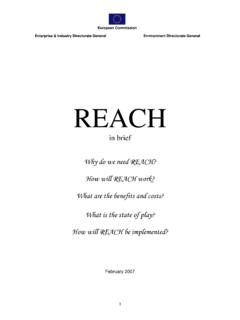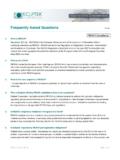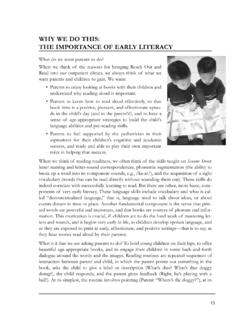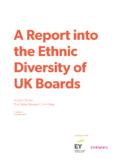Transcription of What is, and to what Purpose do we Study, Business?1
1 what is, and to what Purpose do we study , International Business?1 Klaus E. Meyer China Europe International Business School (CEIBS) AIB Vice President (Programme 2014) Shanghai, August 20, 2012 In the globalized, flat world, do we still need a special field of study called international business (IB)? Yes, we do, and more than ever, as I will argue in this essay. Opportunities to engage across national borders are rapidly growing in scope and complexity, while only marginally reducing the challenges of managing across borders. IB scholars explore how and why cross national differences matter, and how businesses are able to transcend national (and other) differences. To this end, we integrate context and general theory, which allows us to not only advance theories but use our research to contribute to major debates in management practice and politics.
2 IB matters because Local Context matters! On the international stage, businesses encounter a wide variety of opportunities and challenges that arise from their position as (initial) outsider to a local context different than their home country. These opportunities and challenges provide the starting point for IB scholars to investigate businesses that engage with, and bridge, multiple contexts. Business, like any social activity, is shaped by it is context. Hence management scholars, like other social scientists, deal with phenomena taking place in a specific social context. Identifying, describing, and assessing the context bound nature of a phenomenon, 1 The framing of the question draws on Friedrich Schiller s inaugural speech as Professor of Philosophy at the University of Jena, 1789: Was heisst und zu welchem Ende studiert man Universalgeschichte?
3 ( what is and with what Purpose do we study universal history?) Klaus Meyer: what is, and to what Purpose do we study , International Business? 2 however, requires researchers to step outside that context. In other words, when empirical scholars are embedded in the same context as the subjects of their research, they do not have the tools to identify, let along assess, the influence of context. An insider will (normally) share many of the implicit assumptions with the subjects, and thus not be able to make these assumptions explicit. By stepping outside, IB scholars are able to provide deep knowledge of contexts in comparative perspectives, and reflect how phenomena are shaped by national contexts, and offer critical self evaluation of a home IB researchers looking beyond single countries can recognize these contextual issues, make them explicit, and thus enable systematic analysis.
4 This process is essential for theory development because it allows specifying the contextual boundaries of theories. Only when theories have received empirical support in a variety of contexts can we confidently assume their general (or universal ) validity. Moreover, multi country studies enable identifying and testing how context level moderators impact on relationships proposed by theory. This multi functional and multi disciplinary research agenda involves all aspects of business from macro themes such as the interaction of businesses with national government and supra national organizations to micro themes such as the cultural adjustments of expatriates, or consumer attitudes to foreign brands. In fact, for me personally, the interaction with scholars analysing businesses from a wide range of perspectives, yet with a common interest in the international dimension, is one of the most stimulating aspects of AIB events.
5 what we share as a scholarly community is an acute awareness that national differences matter for individuals and organizations engaging in business. This focus on how differences in (national) contexts matter for business, and how individuals and organizations deal with such differences is the basis for most contributions of IB research to mainstream management scholarship. They relate, firstly, to concepts and 2 Context is a broad concept. IB scholars focus mostly on national context, though for some research questions the appropriate unit of analysis may be lower geographic levels such as provinces within countries or higher levels such as the European Union. In addition, industry (especially differences between manufacturing and services) and historical time explain many of the differences observed by businesses and empirical studies.
6 For ease of argument, I focus in this essay on national contexts, though many arguments apply equally to other dimensions of context. Klaus Meyer: what is, and to what Purpose do we study , International Business? 3 theories that help explaining the relevance of national context for business, for example (national) institutions such as culture, rules and regulation, political risk, economic systems, legal systems, psychic distance, and variations of these concepts. Secondly, they relate to businesses bridging across contexts, for example, the theory of the multinational enterprise, process models of internationalization, the integration responsiveness framework, or contemporary work on knowledge management in MNEs and on global value chains. Third, they relate to individuals crossing borders in the pursuit of business, for example as negotiators, cross cultural teams, expatriates, global careers or other roles.
7 These research agendas serve at a primary level to better understand, and hence enhance, the operations of businesses that cross borders, or wish to learn from business practices observed elsewhere (Peng, 2004). However, at a higher level, IB scholarship goes beyond helping firms perform better. Internationally operating businesses make an important contribution to all the societies they engage with which can be positive or negative (Meyer, 2004). By better understanding and explaining these interactions, IB scholars can lay the foundations for improved business practices and perhaps even governmental regulation that enhance the potential of business to make a positive contribution to society. Indigenous Research and International Business Like IB scholars, indigenous management researchers are acutely aware of the importance of local context. Indigenous research, or context bound research, investigates business in a single context, while relating explicitly to global scholarly conversations, notably by exploring new phenomena through the lens of established theory, or by applying existing theories in novel contexts with the aim to deepen or extend them (Tsui, 2007; Meyer, 2007).
8 The growing recognition of such indigenous research is reflected in the rising status of two journals dedicated to indigenous research in Asia, the Asia Pacific Journal of Management (APJM) and Management Organization Review (MOR), which achieved SSCI impact factors of respectively and in 2011, and were ranked them 21st and 29th among management journals in the journal citation reports. Klaus Meyer: what is, and to what Purpose do we study , International Business? 4 Indigenous research is more than studying business in a particular country, such as the country the researcher originates from. For young scholars, a focus on a single country may be a good starting point for a scholarly career in the field. In fact, I continue to believe in the importance of geographic replication studies as a means to establish the contextual boundaries or generalizability of our theories (Meyer, 2007), notwithstanding the dismissive attitude of some esteemed colleagues.
9 However, single country studies are often insufficient to generate knowledge of more than local value because they fail to identify what this context has in common with other contexts, and what is truly unique. I observe two common fallacies: one is to assume everything is the same unless proven otherwise (a general theory illusion); the other is to reject the applicability of experiences elsewhere and develop entirely new models that almost invariably reinvent the wheel (an exceptionalism illusion). what brings us forward is the middle ground; research that deeply contextualizes yet engages with theoretical insights from elsewhere, and thereby develops theoretical propositions relevant across contexts. An interesting case of a successful indigenous researcher with global reach is Ikujiro Nonaka, who was named Eminent Scholar of the AIB at the 2012 conference in Washington.
10 Most of his empirical research investigated Japanese organizations, and identified organizational principles of knowledge management that in the first instance apply in the specific cultural context of large, Japanese firms. However, over a series of studies he developed concepts and theoretical frameworks (Nonaka 1994) that made his work relevant beyond Japan, eventually making him one of the most cited scholars in his field. Indigenous research is complemented by area studies research offering deep and integrative knowledge of specific countries. Some business schools locate area specialists within an IB department because not only can area studies and IB mutually benefit from intellectual exchange, but many of the wider missions of a business school especially teaching and policy advice often require integrating deep understanding of local contexts with the conceptual perspectives of IB scholars.










